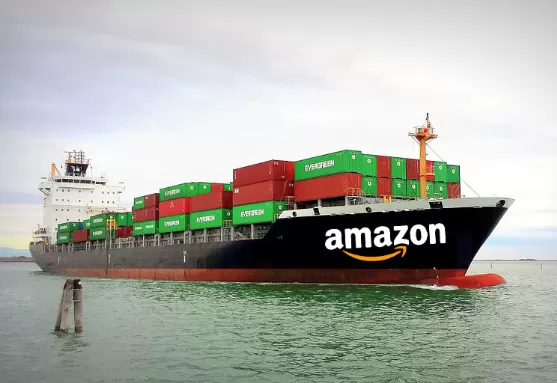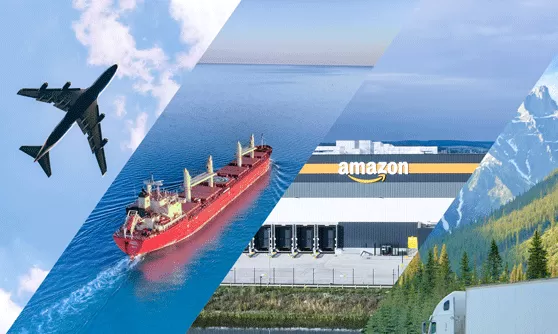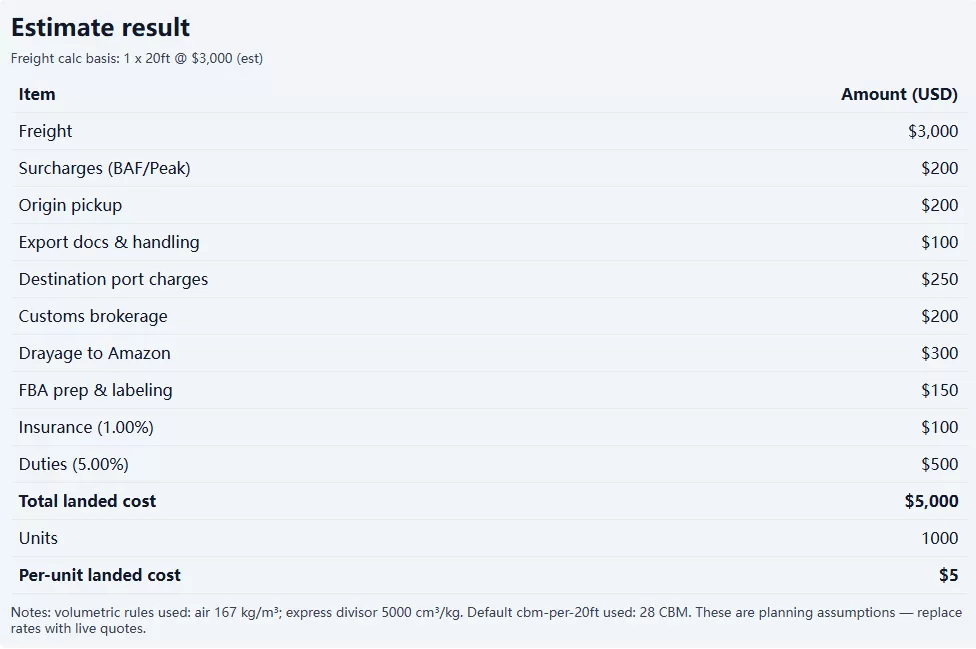LA sellers, Amazon ops, and importers—this guide cuts through the fluff. You’ll get clear cost ranges, transit-time expectations, a simple FBA checklist, and practical steps to get live quotes and avoid chargebacks.Our service coverage.
Whether your FBA warehouse is in a major gateway like Los Angeles, in an inland city like Denver or Phoenix, or even a smaller distribution center, we can provide professional delivery services.
Highlights
Sea (FCL) is the cheapest per unit—action: consolidate to full containers when possible. (Use FBX to benchmark container rates.)
Air (FAX) is the fastest but costlier per kg—action: reserve air for high-margin or emergency SKUs.
Market volatility continues in 2025—action: always ask for live quotes and add a price buffer. (DHL market updates show changing capacity and surcharges.)
2024 saw record air cargo growth—action: book air space early during high demand. (IATA data).
Amazon rejects mostly come from labeling/pallet mistakes—action: run a 48-hour pre-check before arrival.
To get a real landed cost fast, prepare HS codes, dimensions, and commercial value, then request DDP vs FOB quotes from 3 forwarders.
Table of Contents
Modes at a glance
Cost & transit comparison (table + assumptions)
How shipping to Amazon FBA works—quick steps
Sea vs Air vs Rail—Decision Checklist
Cost optimization tactics (practical)
Itemized sample cost table (copy-paste)
FBA compliance checklist (copyable)
FAQ (12 short Qs)
Final takeaways & next steps
Modes at a glance
Sea freight (FCL / LCL)—lowest per-unit cost for bulk. Use FCL if you can fill the container; use LCL or consolidation if not. Benchmark container spot rates with FBX.
Air freight—quick (days), priced per kg (and by volumetric weight). Benchmark with Freightos Air Index (FAX).
Rail/intermodal—strong for Asia↔Europe and for long US land legs; not usually a direct Asia→US FBA option unless combined multimodally.
Express couriers (DHL/FedEx/UPS)—fastest door-to-door for small parcels; expensive for palletized FBA loads. DHL market notes help explain surcharges and capacity shifts.
Special lines Alaska Hawaii
Cost & transit comparison
Assumptions: example lane = Shanghai → Los Angeles. Prices are planning estimates (market snapshots). Estimates do not include customs duties unless noted. Always request live quotes. Sources: Freightos FBX/FAX, DHL market updates, and IATA air cargo data.
| Mode |
Typical landed cost (planning) |
Transit time (typical) |
Best use |
| Sea—FCL (20ft) |
$2,800–$6,000 per 20 ft (planning range; varies by season & surcharges). |
14–30 days ocean + drayage & customs |
Bulk restock; lowest per-unit cost |
| Sea—LCL (per CBM) |
$40–$120 / CBM (includes consolidation fees; wide range) |
18–35 days |
Small volumes; expect extra handling |
| Air cargo (per kg) |
Varies by lane—check FAX (often 3–10× per-kg cost vs. sea on a unit basis). |
1–7 days |
Urgent replenishment, high-value SKUs |
| Express courier |
Premium per kg / per shipment |
1–4 days |
Samples, emergency single-SKU restocks |
| Rail (multimodal) |
Varies—competitive between sea and air on some corridors |
14–21 days (Asia–Europe) |
Useful in multimodal chains; rarely direct for Asia→US FBA |
Quick note: container and air indexes (FBX, FAX) are the best quick benchmarks to spot market moves. Use them to check if a quote is reasonable.
How shipping to Amazon FBA works
Get SKU data: weight, dimensions, HS code, and commercial value.
Choose Incoterm: EXW/FOB (you export) vs. DDP (forwarder handles duties). DDP simplifies Amazon handoff but costs more upfront.
Book with a forwarder: FCL/LCL/air/express—ask for “FBA-ready” services (labeling, palletizing, polybagging).
Export clearance: the forwarder files export docs (commercial invoice, packing list, B/L, or AWB).
Transit & tracking: monitor FBX/FAX trends if market-sensitive.
Import & drayage: pay duties (unless DDP); the forwarder handles delivery to the Amazon dock.
Amazon appointment: the carrier must book and meet Amazon pallet/label rules—mistakes here cause rejections and fees.
Sea vs Air vs Rail
Choose Sea FCL when you have volume, predictable demand, and want the lowest cost per unit.
Choose LCL when volume is small and timing is flexible—accept longer handling and consolidation time.
Choose Air when speed outweighs cost—urgent SKUs or high-margin items. (IATA: 2024 air cargo grew strongly—book early in peaks).
Choose Express for samples/urgent single cartons.
Consider multimodal if one leg is priced unpredictably (e.g., sea to Mexico + truck to US).
Cost optimization tactics (actionable)
Consolidate: group SKUs to fill FCL and cut per-unit ocean cost.
Negotiate Incoterms: DDP removes surprise duties from your buyer’s side; FOB/EXW can be cheaper if you manage customs well.
Shrink packaging and optimize palletization: reduces volumetric weight for air and avoids Amazon rejections.
Compare landed cost (not just freight): include freight, duties, customs brokerage, drayage, FBA prep, and insurance.
Monitor indexes: use FBX for ocean and FAX for air as decision signals before booking.
Itemized sample cost table (copy-paste template)
Scenario: Shanghai → LA, 20 ft FCL, commodity value $10,000, EXW origin. Use numbers as planning examples—ask forwarders for live quotes.
| Cost item |
Example amount (USD) |
Notes |
| Origin pick-up (EXW to port) |
$200 |
Varies by city |
| Export docs & handling |
$100 |
Broker & docs |
| Ocean freight (20ft) |
$2,000 |
Spot varies—check FBX. |
| BAF/Peak surcharges |
$200 |
Fuel & peak season fees |
| Destination port charges |
$250 |
Terminal handling |
| Customs brokerage |
$200 |
Estimate—depends on HS code |
| Duties (example rate 2%) |
$200 |
Based on declared value—adjust to HS code |
| Drayage to Amazon (truck) |
$300 |
LA drayage + appointment fees |
| FBA prep & labeling |
$150 |
If forwarder does prep |
| Insurance (1% of value) |
$100 |
Optional, recommended |
| Estimated total landed |
$3,700 |
Planning number—get live quotes |
How to use: change ocean freight to live quote, adjust duties by your HS code, and plug in your actual drayage and prep fees.
FBA compliance checklist
Correct FBA warehouse address and shipment ID on B/L/AWB and packing list.
FNSKU / barcode labels on cartons per Amazon rules.
Pallets: no overhang, standard pallet dimensions only, wrapped and strapped.
Declared weights and dimensions match the packing list.
The commercial invoice includes HS codes, unit price, and total value.
The carrier booked an appointment; confirm the slot and ASN if needed.
Prep services decided who does polybag, labeling, bubble wrap, etc. (Forwarder or Amazon?)
FAQ
Q: Can you deliver to smaller FBA warehouses like Little Rock or Bridgeport?
A: Absolutely! We ship nationwide..." This is a great way to introduce a niche city page.
Q: What’s the cheapest way to ship to Amazon FBA USA?
A: Sea FCL is usually cheapest per unit for bulk. LCL can be OK for small volumes, but expect extra handling.
Q: How fast can inventory reach an Amazon warehouse?
A: Express/air: 1–7 days. Ocean: roughly 2–6+ weeks, including drayage and customs.
Q: How do I benchmark if a quote is fair?
A: Compare the ocean quote against FBX and air quotes against FAX; they’re good market checks.
Q: DDP or FOB—which is better for FBA?
A: DDP removes customs surprises and simplifies delivery to Amazon but costs more up front. FOB/EXW can save money if you manage customs well.
Q: Do I need cargo insurance?
A: Yes, for valuable shipments. Insurance covers loss/damage across ocean/air and during drayage.
Q: What causes price swings in freight?
A: Carrier capacity, peak season demand, fuel surcharges, port congestion, and geopolitical events. DHL’s market notes show capacity shifts are common.
Q: Will Amazon accept any pallet?
A: No. Follow Amazon pallet rules exactly (no overhang, correct dimensions, proper labels) or face refusals/fees.
Q: How do I avoid Amazon rejections?
A: Run the 48-hour pre-check: labels, pallet build, paperwork, and appointment confirmation.
Q: Can small sellers use FCL to save money?
A: Only if you can fill or nearly fill the container. Otherwise, use consolidation or LCL programs.
Q: How to get three quick landed-cost quotes?
A: Prepare SKU dimensions/weights, HS codes, and value. Ask 3 forwarders for DDP and FOB landed-cost quotes—compare total, not just freight.
Q: Is rail a good option from China to the US?
A: Not typically—rail shines for Asia↔Europe and domestic US land legs. For Asia→US FBA, rail is usually part of a multimodal plan, not a direct route.
Q: Where to check market trends fast?
A: Use FBX for ocean and FAX for air. Follow DHL market updates and IATA air cargo reports for capacity and demand signals.
Final takeaways & next steps
Sea (FCL) = low cost. Air = speed. Express = emergency. Use FBX/FAX to check quotes against the market.
Always request live landed-cost quotes that include drayage, customs brokerage, duties, FBA prep, and insurance.
Run the 48-hour FBA pre-check to avoid rejections.
Want this in CMS-ready blocks? I can paste a one-page comparison table and the itemized cost template as HTML or Markdown. Which format do you want?
Amazon International Shipping Calculator
Estimate the landed cost to deliver cargo to an Amazon FBA warehouse. Defaults are planning examples—replace with live quotes for accuracy.
You may also be interested in
Shipping From China to Boise
How Long Does It Take to Ship from China to Chicago?
Shipping From China To Honolulu
China to Jacksonville Shipping

 EN
EN
 FR
FR
 ES
ES
 JA
JA
 PT
PT
 RU
RU
 AR
AR







